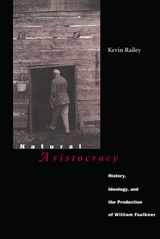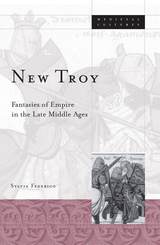111 books about Knowledge and learning and 3
start with N
111 books about Knowledge and learning and 3
111 books about Knowledge and learning
3 start with N start with N
3 start with N start with N

Natural Aristocracy
History, Ideology, and the Production of William Faulkner
Kevin Railey
University of Alabama Press, 1999
Kevin Railey uses a materialist critical approach--which envisions literature as a discourse necessarily interactive with other forces in the world--to identify and historicize Faulkner’s authorial identity. Working from the assumption that Faulkner was deeply affected by the sociohistorical forces that surrounded his life, Railey explores the interrelationships between American history and Faulkner’s fiction, between southern history and Faulkner’s subjectivity. Railey argues that Faulkner’s obsession with history and his struggle with specific ideologies affecting southern society and his family guided his development as an artist, influencing and overdetermining characterizations and narrative structures as well as the social vision manifest in his work. By seeing Faulkner the artist and Faulkner the man as one and the same, Railey concludes that the celebrated author wrote himself into history in a way that satisfied the image he had of himself as a natural, artistic aristocrat, based on the notion of natural aristocracy.
After examining two prevailing and opposing ideologies in the South of Faulkner’s lifetime--paternalism and liberalism--Railey shows how Faulkner’s working-through of his identifications with these forces helped develop his values and perceptions as an artist and individual. Railey reads Faulkner’s fiction as exploring social concerns about the demise of paternalism, questions of leadership within liberalism, and doubts about both an aristocracy of heritage and one of wealth. This reading of The Sound and the Fury, As I Lay Dying, Sanctuary, Light in August, Absalom, Absalom!, the Snopes trilogy and The Reivers details Faulkner’s explorations of various manifestations of paternalism and liberalism and the intense conflict between them, as well as his attempts to resolve that conflict.
Providing new insights into the full range of Faulkner’s fiction, Natural Aristocracy is the first systematic materialist critique of the author and his world.
[more]

New Troy
Fantasies Of Empire In The Late Middle Ages
Sylvia Federico
University of Minnesota Press, 2003
Examines the political and literary uses of the Trojan legend in the medieval period.
England in the late fourteenth century witnessed a large-scale social revolt, a lingering and seemingly hopeless war with France, and fierce factional conflicts in royal politics and London civic government--struggles in which all parties sought to justify their actions by claiming historical precedent. How the Trojan legend figured in these claims--and in competing assertions of authorial legitimacy, nationhood, and rule in the later Middle Ages--is the complex nexus of history, myth, literature, and identity that Sylvia Federico explores in this ambitious book.
During the late medieval period, many European political and social groups took great pains to associate themselves with the ancient city; the claim on Troy, Federico asserts, was crucial to nationhood and was always a political act. Her book examines the poetry and prose of several late medieval authors, focusing particularly on how Chaucer's use of the Trojan legend helped to set the terms by which the Ricardian and Lancastrian periods were distinguished, and further helped to establish English literary history as a noble precedent in its own right. Federico's book affords remarkable insight into the workings of the medieval historical imagination.
Sylvia Federico has taught at Washington State University and the University of Leeds. She currently lives in Maine.
[more]

No Man's Garden
Thoreau And A New Vision For Civilization And Nature
Daniel B Botkin
Island Press, 2001
In No Man's Garden, ecologist Daniel Botkin takes a fresh look at the life and writings of Henry David Thoreau to discover a model for reconciling the conflict between nature and civilization that lies at the heart of our environmental problems. He offers an insightful reinterpretation of Thoreau, drawing a surprising picture of the “hermit of Walden” as a man who loved wildness, but who found it in the woods and swamps on the outskirts of town as easily as in the remote forests of Maine, and who firmly believed in the value and importance of human beings and civilization.Botkin integrates into the familiar image of Thoreau, the solitary seeker, other, equally important aspects of his personality and career -- as a first-rate ecologist whose close, long-term observation of his surroundings shows the value of using a scientific approach, as an engineer who was comfortable working out technical problems in his father's pencil factory, and as someone who was deeply concerned about the spiritual importance of nature to people.This new view of one of the founding fathers of American environmental thought lays the groundwork for an innovative approach to solving environmental problems. Botkin argues that the topics typically thought of as “environmental,” and the issues and concerns of “environmentalism,” are in fact rooted in some of humanity's deepest concerns -- our fundamental physical and spiritual connection with nature, and the mutually beneficial ways that society and nature can persist together. He makes the case that by understanding the true scientific, philosophical, and spiritual bases of environmental positions we will be able to develop a means of preserving the health of our biosphere that simultaneously allows for the further growth and development of civilization.No Man's Garden presents a vital challenge to the assumptions and conventional wisdom of environmentalism, and will be must reading for anyone interested in developing a deeper understanding of interactions between humans and nature.
[more]
READERS
Browse our collection.
PUBLISHERS
See BiblioVault's publisher services.
STUDENT SERVICES
Files for college accessibility offices.
UChicago Accessibility Resources
home | accessibility | search | about | contact us
BiblioVault ® 2001 - 2024
The University of Chicago Press









